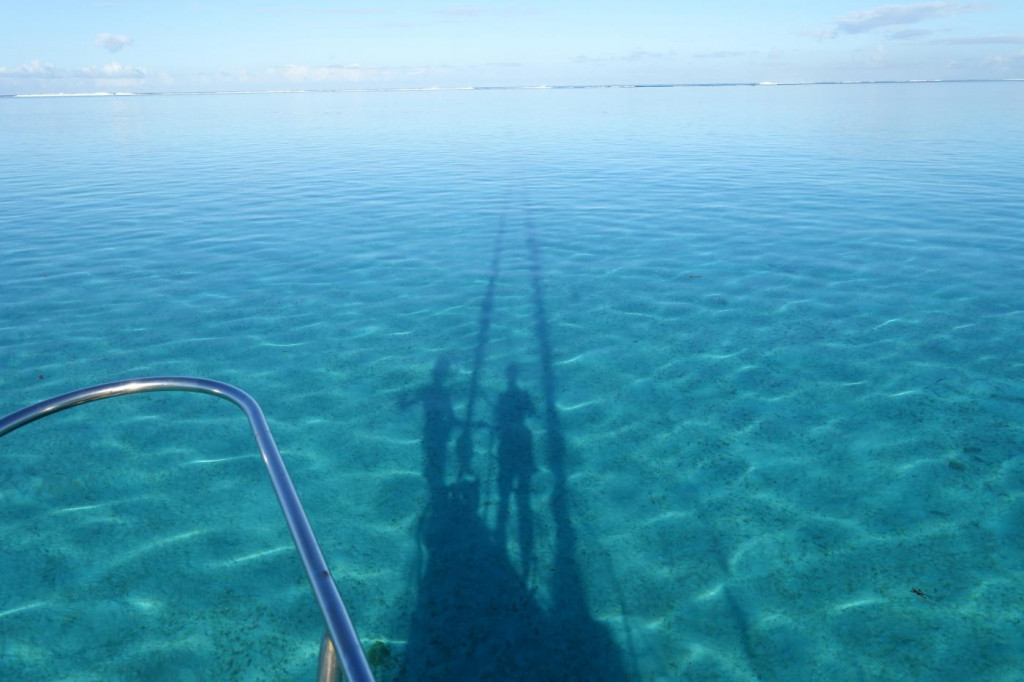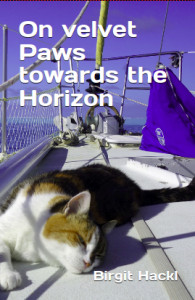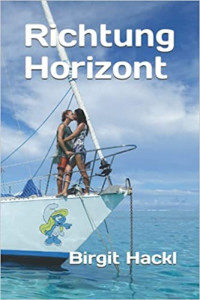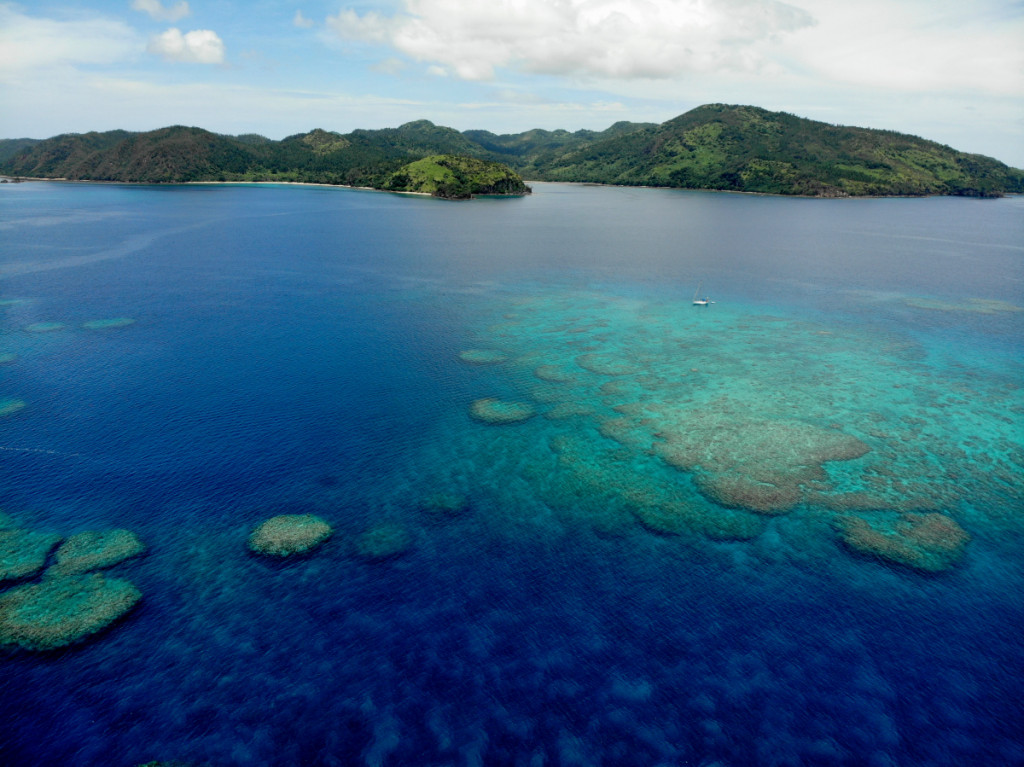We were planning to return to Suva in May anyway, but now we are forced to sail there slightly earlier, because our fridge has developed a leak… As soon as we’re back in the capital we have to have that fixed, then an overhauled pump will (hopefully) arrive from the US for our watermaker, we have to fix our sprayhood (the material we got for the window repair in Tahiti was too thin, so we have to do it again after just 2 years), the wind instrument on the mast no longer works and has to come down and then we have to do a last shopping round, prepare the check-in for Vanuatu and the check-out for Fiji and, and, and…
With all those tasks looming ahead like a dark cloud on the horizon we wanted to make our last day “out on the islands” extra pleasant, so after the usual morning chores (bread, laundry and then some hull cleaning) we took Pitufa out to the reef for the last time to go snorkeling there. We had a great time in the fabulous underwater landscapes of the barrier reef of Gau with some patches of healthy coral and others sadly bleached. Towards the end of the snorkel a sea snake came by and then a well-sized lemon decided to say hi and really make this a special day! So we saw our first proper-sized shark during our last visit to Fiji’s underwater world…
We finished off the day with a walk on the beach and a sundowner on Pitufa with the parrots ashore singing us a good-bye serenade (well, squawking a serenade, but it’s the thought that counts) ![]()
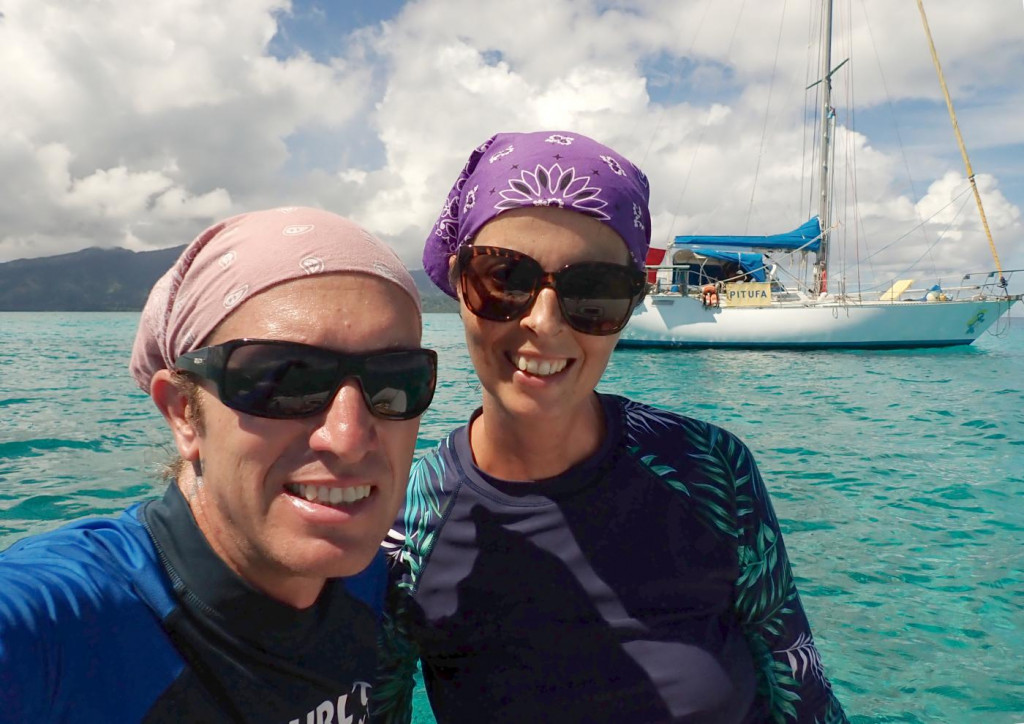
2024
29
Apr
Our last day in paradise
2024
28
Apr
Sea snake!
Here in Fiji we quite often encounter sea snakes while snorkeling and watch them foraging for food on coral reefs and heading up to the surface occasionally to take a breath. They are extremely venomous, but fortunately not aggressive and apparently their mouths are too small to bite something as big as a human (maybe a pinky toe would fit, but they are safely hidden in the fins ![]() , so we are not worried when we see one. All the ones we’ve met so far were less than a metre, but in Gau we saw one that was at least one and a half metres! We looked it up, apparently males grow to 80 cm and females to 1.40, so we must have encountered a fully grown, female yellow-lipped sea krait – exciting!
, so we are not worried when we see one. All the ones we’ve met so far were less than a metre, but in Gau we saw one that was at least one and a half metres! We looked it up, apparently males grow to 80 cm and females to 1.40, so we must have encountered a fully grown, female yellow-lipped sea krait – exciting!
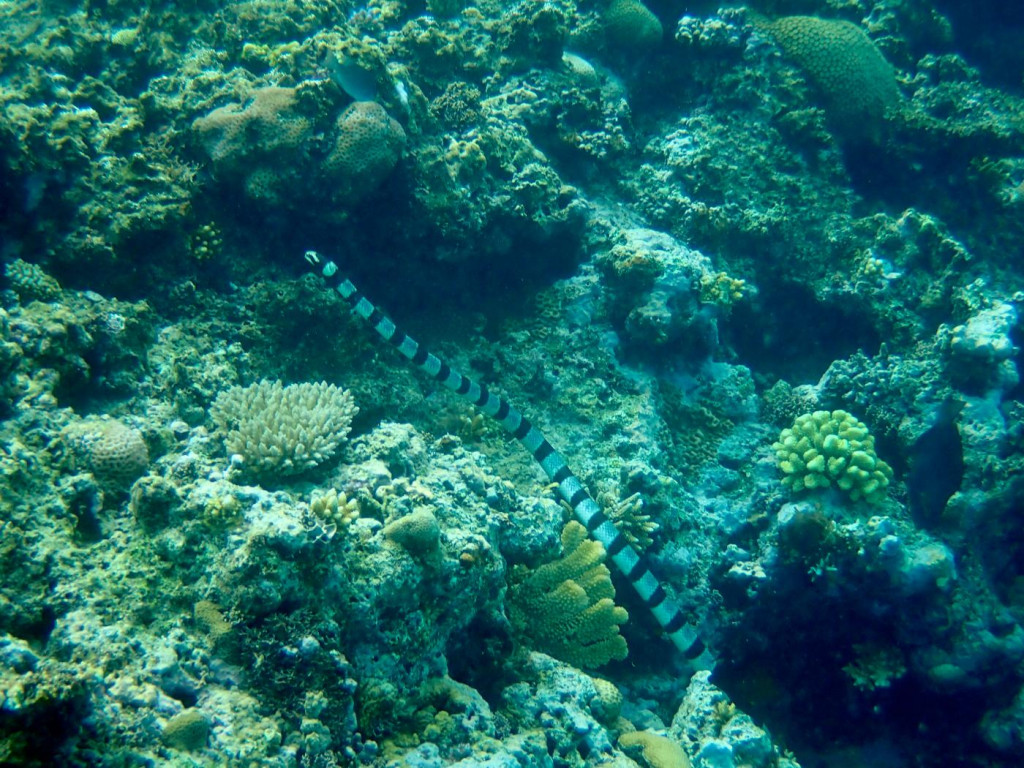
2024
27
Apr
Gau
Last week we used a light northeasterly wind to sail 30 nm to the next island. Gau is Fiji’s 5th biggest island and it’s pretty with lush hills and a barrier reef and lagoon on the east side (just a fringing reef in the north and west).
We anchored in the big, protected bay of Waikama and went ashore to introduce ourselves and bring a sevusevu (bundle of kava). Philipe, the headman, told us about a newly installed marine protected zone (they’ve had others before) and a project to plant mangroves–a very positive first impression! We then went for a walk, got chatting along the way with Balelevuka who gave us eggplants and plantains he had just harvested and when we got back down to the village, Litia invited us for tea and freshly baked buns! Back on the boat Timoci came by with his sons and a few other boys to say hi and we ended up with more plantains and wild yams…
The warm generosity of its people make Fiji a truly exceptional place ![]()
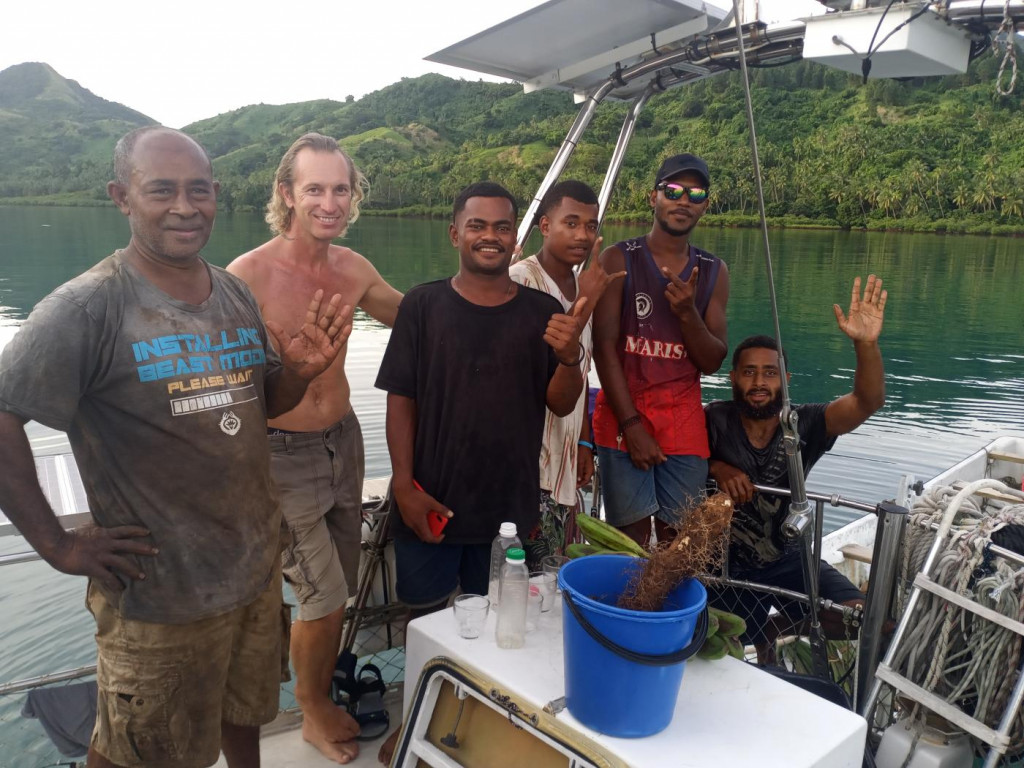
2024
25
Apr
Encounters
Many of the anchorages we visit even in remote places are devoid of life, no fish in the water around the boat, hardly any birds to be seen.
Therefore we really appreciate lively surroundings, like here in Ovalau: most mornings a group of dolphins swims by in the lagoon, swarms of tiny, silvery fish are skipping over the surface fleeing some larger predator, we hear a multitude of different bird songs from the neighbouring shore and snorkeling we encounter reef sharks and sometimes turtles. Most of them scurry away when they see people (they are still hunted here in Fiji), but this one seemed oddly curious or maybe just shortsighted…
“What’s that strange fish over there?”
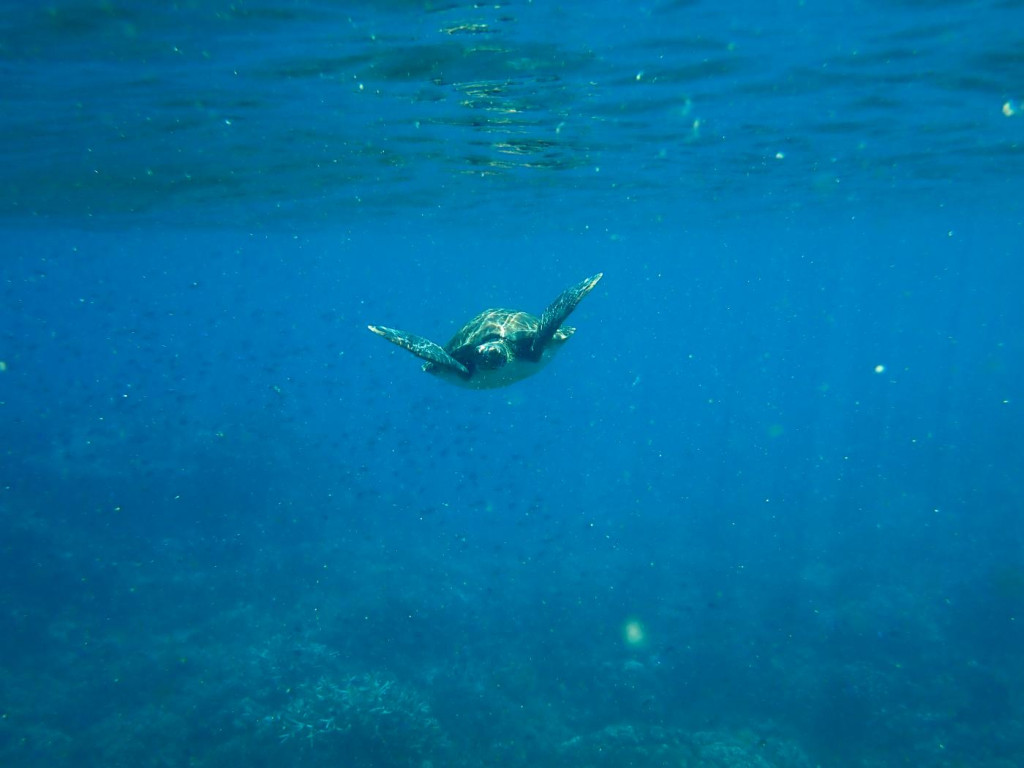
“Let me take a closer look…”
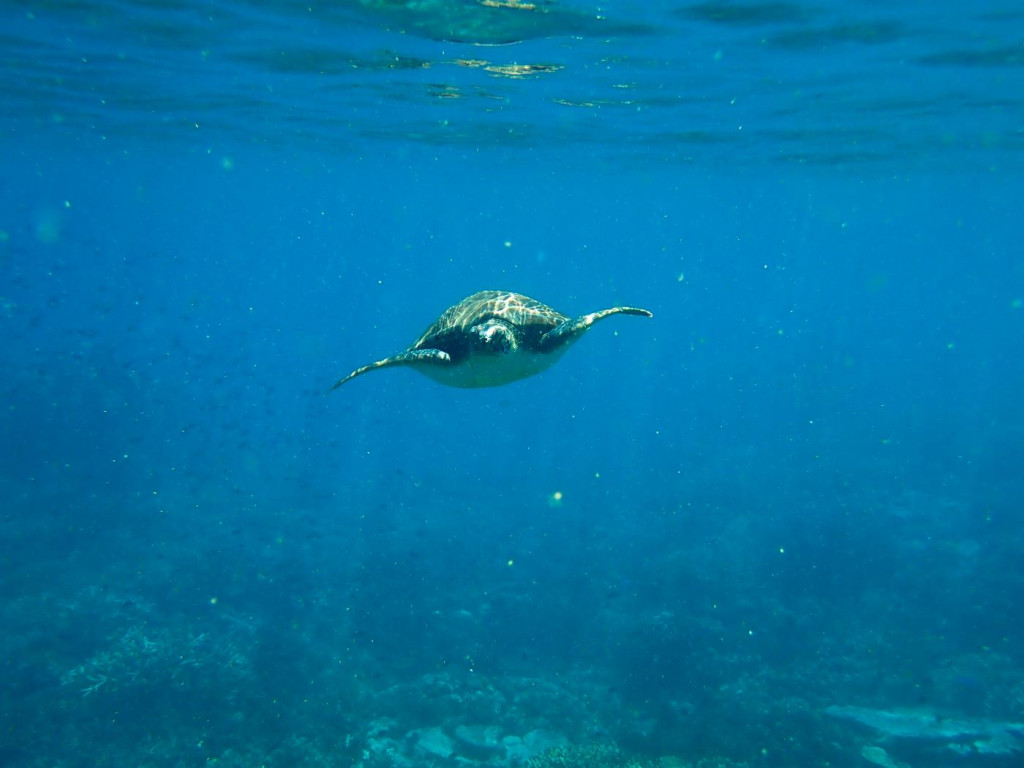
“Oh no, it’s a human predator!!”
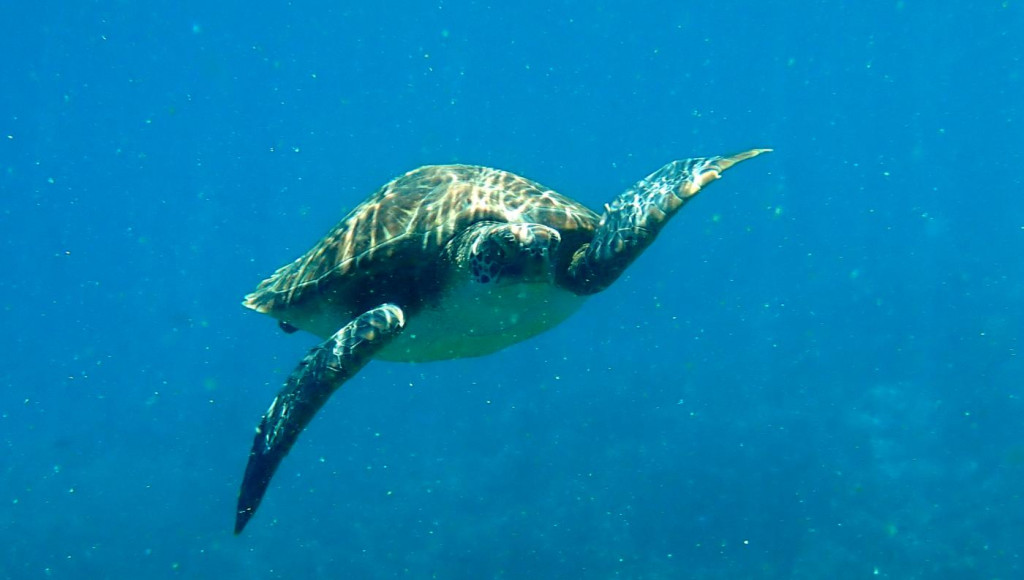
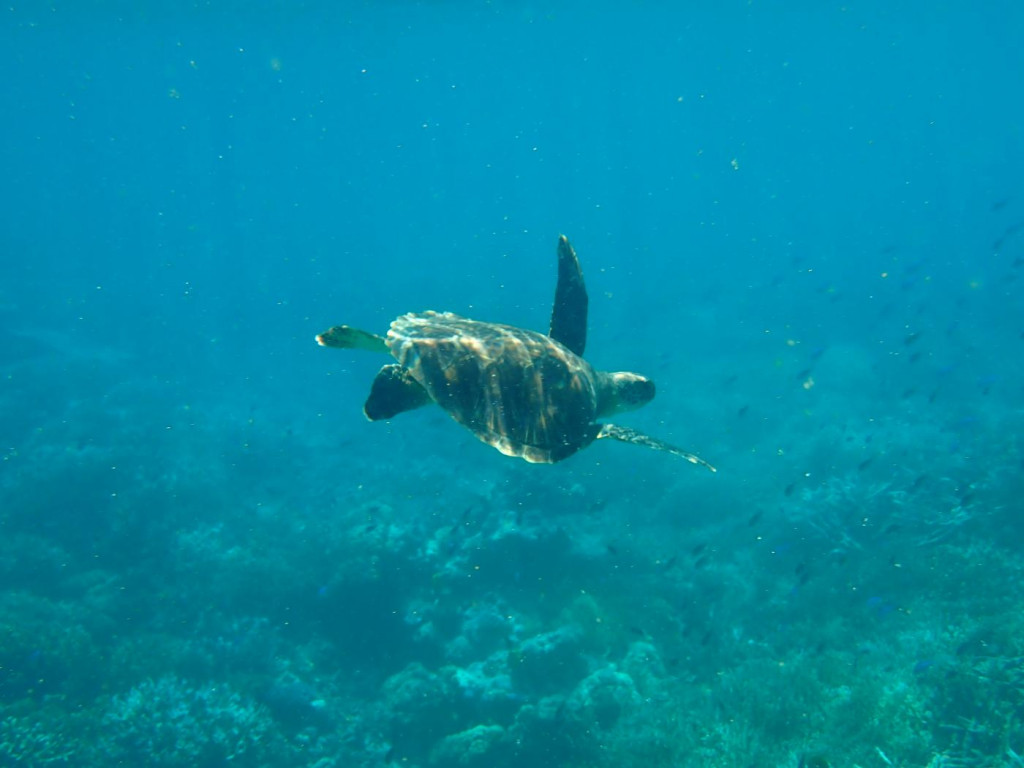
2024
21
Apr
Zipper with velcro protection
Windy and rainy days are maintenance days on Pitufa. The zipper on our lazybag had broken due to UV exposure–even though we had sewn on a protective flap a while ago: the velcro pads to keep the flap down weren’t big enough, so it got blown open regularly in strong winds and that was enough UV exposure to make the plastic of the zipper brittle.
We took down the lazybag before the onset of the squally weather and spent two days on the project: the hardest part was getting off the old zipper and velcro (about 8 metres of tightly stitched tenara double seam), then 4 metres of zipper left, 4 metres right and the same for the velcro–we couldn’t have done it without Miss Pfaff, our sturdy sewing machine…
Now the lazybag’s back on, the mainsail’s up as well and we’re ready to go!
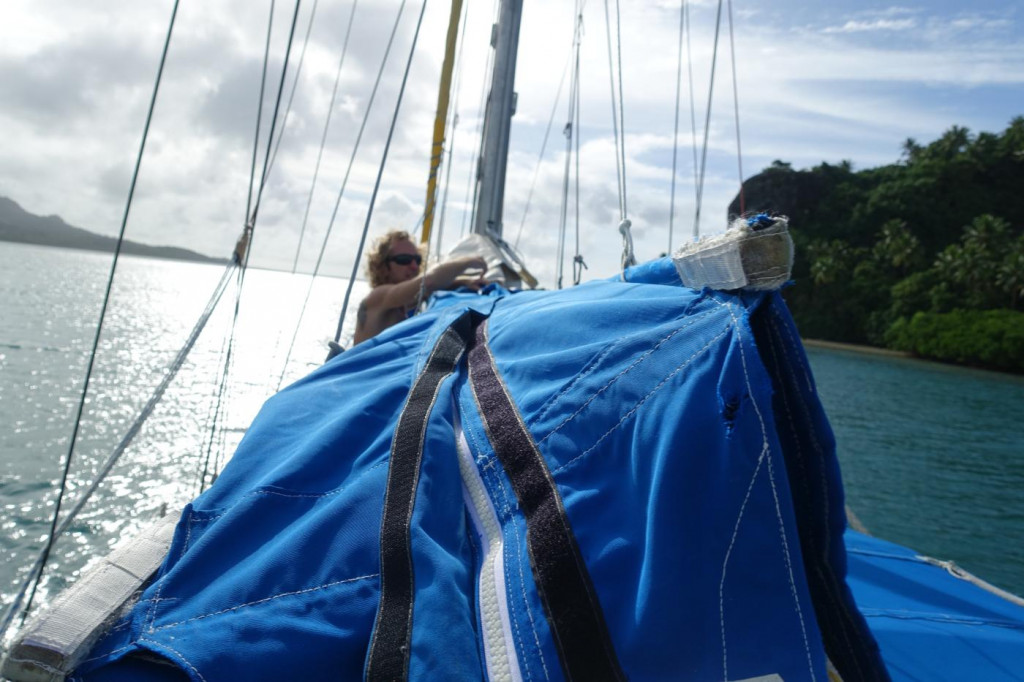
2024
17
Apr
Tricky navigation
We love Ovalau and its lively lagoon, but its shape makes sitting out strong winds rather tricky: it’s oval (hence the name maybe ![]() , there are no motu on the outer reef to hide behind, the few bays on the eastern side are all open to the east and southeast (where the prevailing winds blow from) and there’s no connection between the lagoon on the eastern side and the protected waters on the western side–if you want to get there you have to sail/motor all around the northern end of the island.
, there are no motu on the outer reef to hide behind, the few bays on the eastern side are all open to the east and southeast (where the prevailing winds blow from) and there’s no connection between the lagoon on the eastern side and the protected waters on the western side–if you want to get there you have to sail/motor all around the northern end of the island.
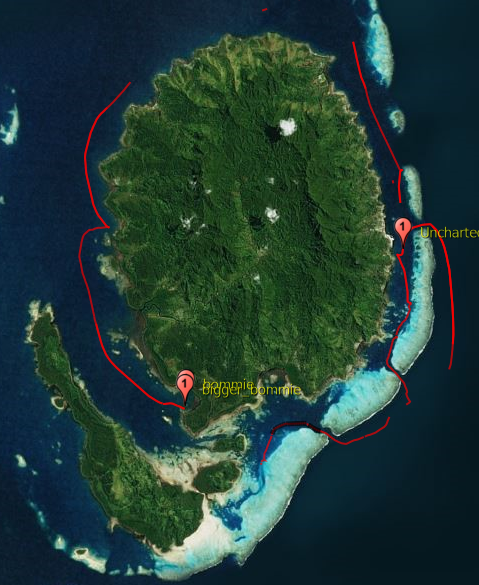
We sat out the last southeasterly on the western side of the island, but this time we didn’t want to do so many miles back and forth again. Instead we went into the lagoon on the southern side of the island, thinking that the wide outer reef there would give us enough protection. Unfortunately lots of chop came over the reef at high tide (we should have known better), so we tried plan B instead: making our way into a protected little hole, hidden behind a maze of reefs.
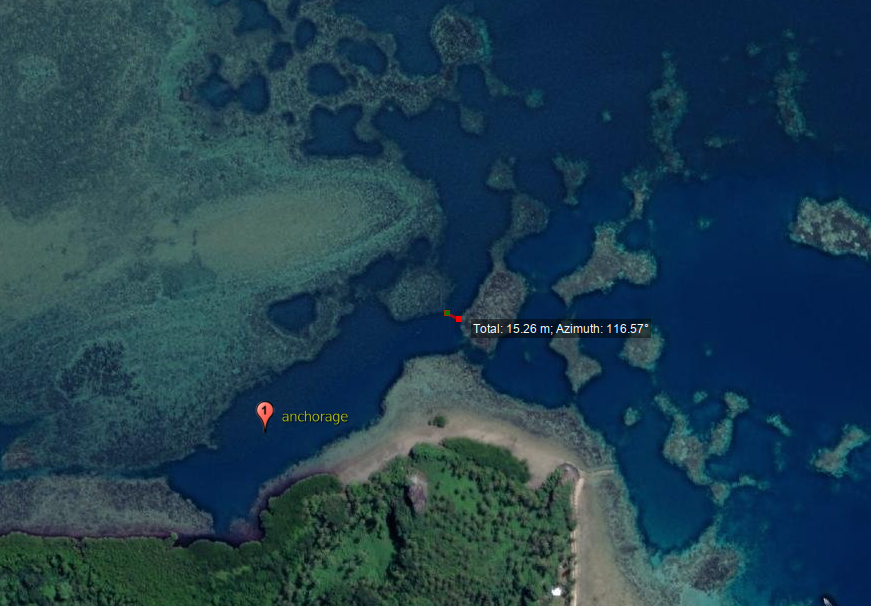
We found good satellite imagery for the area, but in reality the water is very murky, making navigation risky. We slowly navigated through the narrow channels with the reefs lurking left and right, but at noon on a sunny day Christian as look-out on the bow could just make them out, we safely made it in and were rewarded with calm waters and beautiful views!
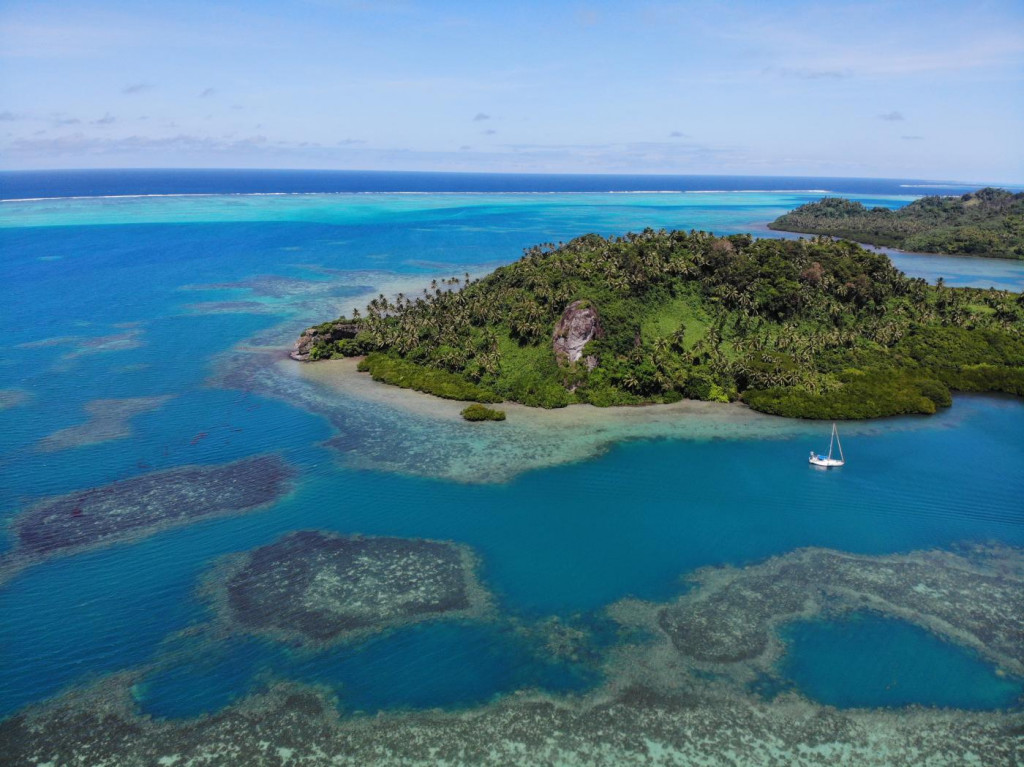
2024
13
Apr
Laundry in a bucket
This morning we awoke to a perfectly calm lagoon, Pitufa was floating in a sea of turquoise surrounded by coralheads, so Christian took the dinghy out to take some pics of our pretty, little Sparkman & Stephens. Of course there’s laundry on the line–you’ll hardly ever see Pitufa without this kind of decoration ![]()
When we set out we used to collect used clothes, towels, etc. in a bag that got smellier and grubbier every day until we finally found a washing machine somewhere to do a big load. In Isabela (Galapagos) we couldn’t load the machine ourselves, but the guy from the launderette took the bag from me to do it himself. He (literally) turned up his nose, gave me an accusing look and said “Es muy sucio” (it’s very dirty). Doing laundry clearly wasn’t his vocation, but I had to admit that he was right.
From then on we stopped accumulating laundry, but simply started washing a few pieces every day. Theoretically we’d have enough energy and water from the solar panels and watermaker to run a washing machine, but we don’t have the space to fit one, so we use a bucket and it’s really not a big deal to wash 4 T-Shirts one day, some knickers the next and from time to time a towel, bedsheet or duvet cover (when the weather looks stable).
Unfortunately this March was really rainy, so we accumulated more things than we usually do and then I found a whole locker containing our spare towels and bed sheets had gone moldy/smelly. Washing those big things in unstable weather conditions was a bit of a challenge, but today we finished the last ones!
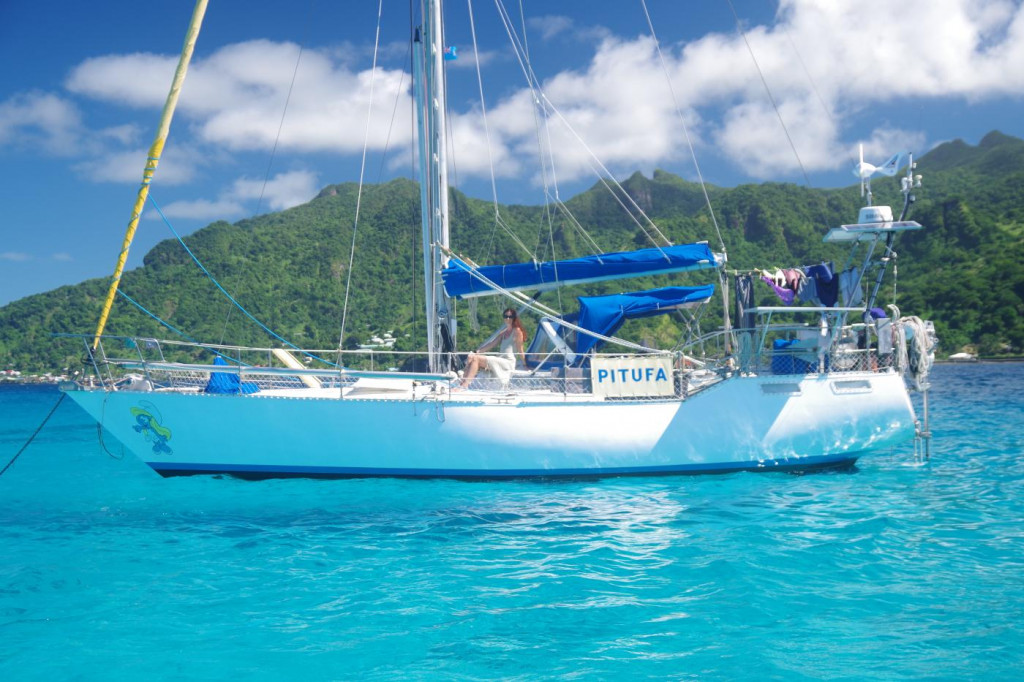
2024
07
Apr
Levuka, Fiji’s old capital
Levuka was founded by sandalwood and beche-de-mer traders and cotton/coconut planters in the 1830s and became Fiji’s first capital, but only for a short time, from 1874 until 1883. The surrounding mountains prevented it from growing and soon Suva was declared the new capital. Levuka froze in time and in 1989 it was designated a historic town and declared a UNESCO World Heritage in 2013.
We got here last week and were enchanted by the colourful, little wooden houses along the sea front on Beach Street that boasts the oldest of everything in Fiji: the oldest police station, the oldest hotel, the oldest club, the first school, etc. Up close you can see that the buildings from colonial times are having a hard time in the wet, tropical climate: mold and algae discolour the facades and wood rots away–most buildings are in need of renovation to prevent the old town from toppling over eventually…
It’s a bustling little town with several supermarkets, hardware-stores (no chains, all local), souvenir shops, market stalls for veg and fruit, a couple of restaurants and even a cafe and a bar(!) and we were surprised to find all that open even on Easter Saturday and Sunday… Taxis roam the (one) coastal road and trucks circle the island and bring villagers from the other side. Behind the old town newer settlements are huddled against the steep hills, behind that a rugged mountain chain soars high, reminding us of the Marquesas in French Polynesia.
Levuka’s location on the east side of the island Ovalau is of course unfortunate for visiting sailboats as the anchorage off town is only protected by a barrier reef and exposed to the prevailing trade winds, so it must be a very bouncy experience in a strong easterly or southeasterly wind (which is the case basically all winter long) and it’s certainly an adventurous experience to leave the dinghy at the pier in such conditions (next to the tuna canning factory and just off the official buildings of customs and immigration). Now in summer there are long phases without wind and we picked such a phase and enjoyed the glassy calm lagoon and even anchored Pitufa on a sandy spot on the outer reef for a day. We were pleasantly surprised to find healthy coral (almost no bleaching), quite a few fishies and even a couple of nosy white-tip sharkies ![]()
Check out our gallery for pics of Levuka!
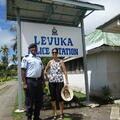
Levuka
Fiji's first capital is an Unesco World Heritage and worth a visit! Cute, little colonial houses and a laid-back atmosphere. We spent a few days anchored off town in calm weather in April 2024.
(20 photos)
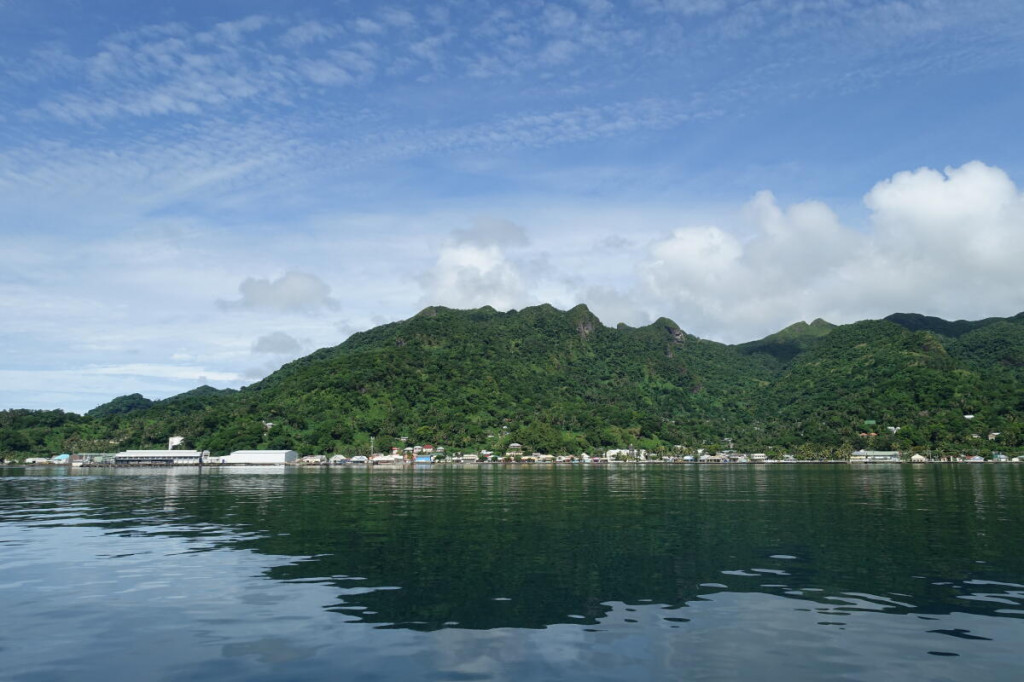
2024
07
Apr
A new AllAtSea issue, a new Pitufa article!
Check out this April’s AllAtSea magazine for an article about the pros and cons of seasonal sailing versus all-year-round cruising!
2024
18
Mar
Lagoon in grey
After some sunny summer months we’re having rainy weather (it’s the rainy season after all) and Kadavu’s lagoon gleams in 2 shades of grey instead of the usual 50 shades of blue and green. We are accumulating more and more damp things on the boat without being able to dry them out, below deck it’s steaming with all hatches closed and mould is growing faster than we can wipe it off. Unfortunately the weather forecasts show that the convergence zone will keep lingering over Fiji, so more unsettled weather is coming. The western parts of Fiji are flooded and the risk of cyclones is also higher with an active MJO (Madden Julian Oscillation) crossing the Pacific.
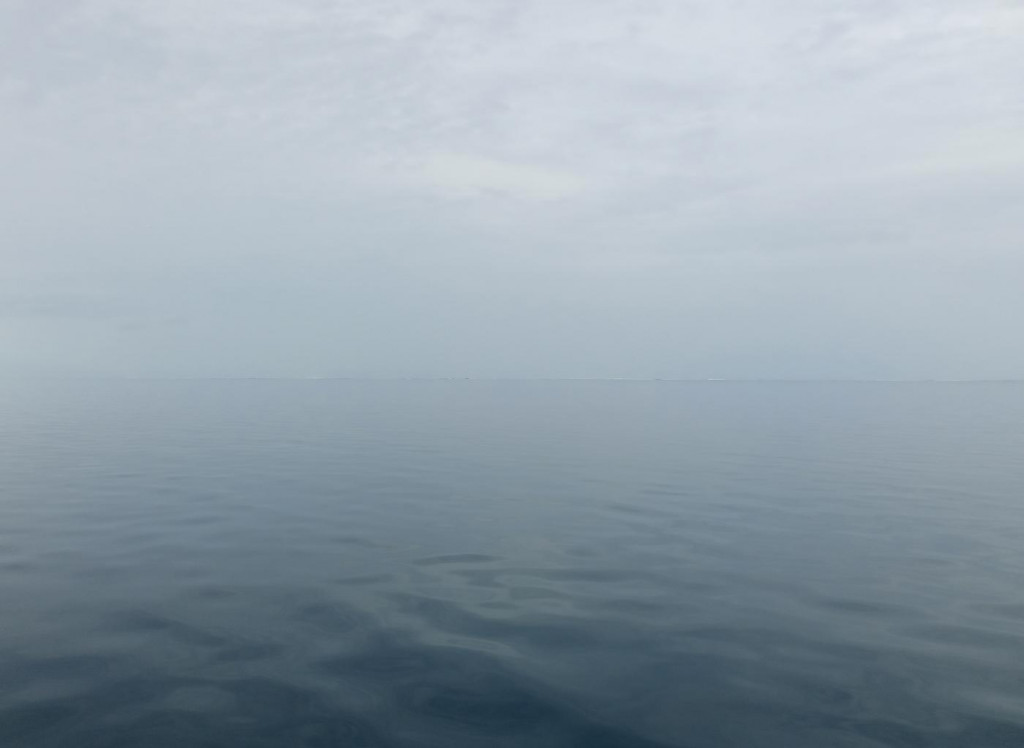
2024
13
Mar
One of our articles in each AllAtSea Caribbean issue this year!
Even though we only spent a brief time in the Caribbean, we’re still writing for the popular AllAtSea magazine there! January’s issue featured “Never bored aboard” about hobbies while cruising, there was a reminder to “Protect Parrotfish” in the February issue and now I’ve just downloaded the March issue and found our “Ode to the hydrovane” about our tireless helmsman Wayne Vaney ![]()
You can either pick up the AllAtSea magazine for free at most chandleries in the Caribbean or you can download the magazine for FREE!
I’ll keep writing as fast as I can to make sure there’ll be Pitufa articles in the following issues as well ![]()
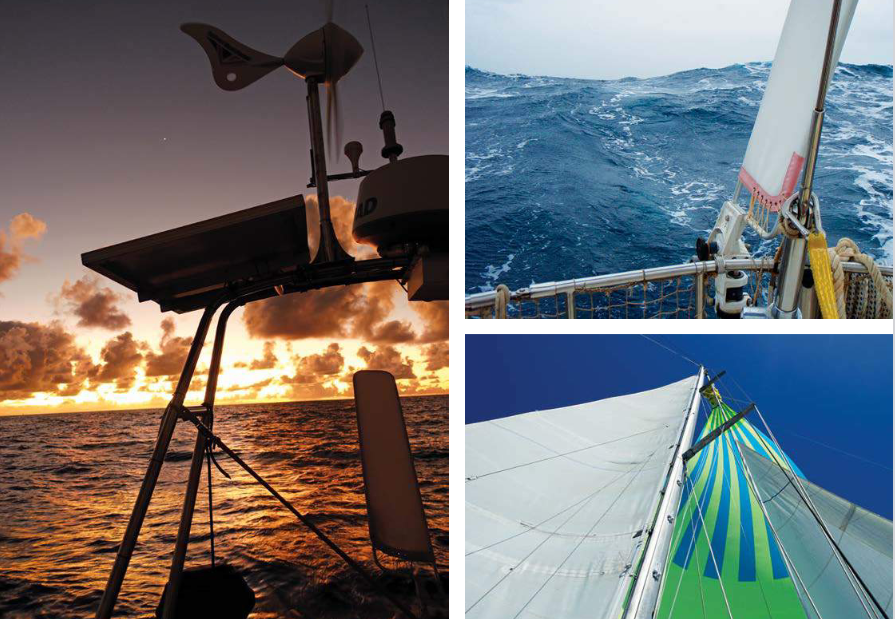
2024
08
Mar
Ashamed to be human
Watching reefs bleach and die makes me ashamed to be human. All those fishies looking up at me, the little clown fish trying to seek shelter in his bleached and dying anemone, the chromis in the algae-overgrown skeleton of a staghorn coral–they don’t know why the reefs are dying. But I know.
Because of overfishing, erosion, pollution and of course global warming. All caused by one species: us (and don’t go and blame farting cows now, because they are bred by humans). Each fish or worm or whatever lowly creature plays their part in the eco-system, except for us humans. We think we are above those rules, so we have the right to destroy the oceans, the whole planet, just because we always want more. More comfort, more profit, more luxuries, more food for more people.
If only people could step back and reflect what they actually need and take less instead of more, more, more.
Sorry to be so negative, but despite the fact that we cherish each corner with healthy coral, try to console ourselves that a half-dead coral colony is actually half-alive, hold on to the hope that some species of coral seem to adapt and anxiously watch the weather for a cold-spell to give them a breather I’m afraid we are just bullshitting ourselves. The reefs are dying so fast, it’s heartbreaking. And yes, nature can adapt, but not when the changes come so fast and on such an extreme level.
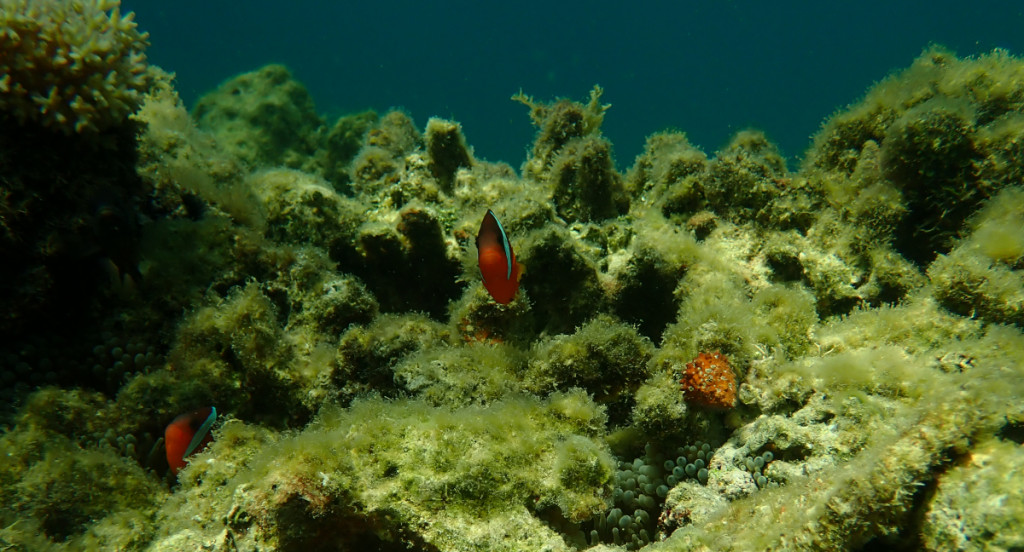
2024
28
Feb
20% discount on Pitufinos this week!
If you’re visiting the Austrian boat show in Tulln this week, come to the Pitufino stand to see the demonstration of its many features! We won’t be there, but our colleague in Austria. We give a 20% boatshow discount, but we have extended the offer to the online shop www.currently-marine.com, so everyone who buys this weeks gets the discount ![]()
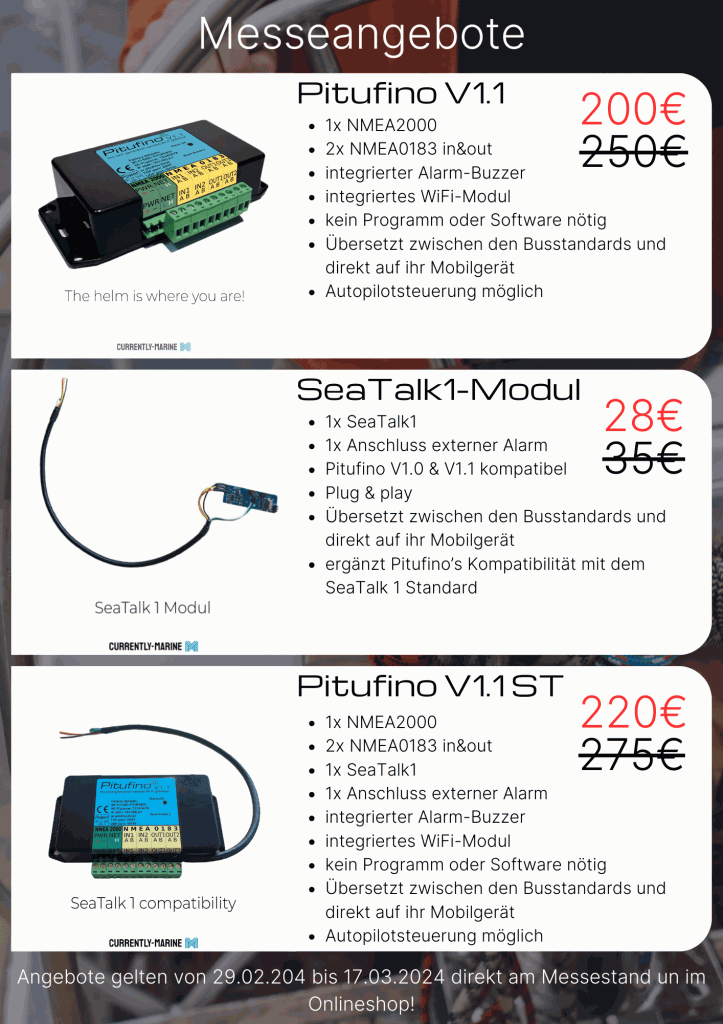
2024
26
Feb
2024
10
Feb
Still alive
Exactly one year ago we had to swim for our lives in the ripping current of the southern pass of Matuku after our accident with a local boat. We somehow made it through the surf, somehow managed to hold on to the sunken boat for an hour while waiting for rescue. Poor Maikeli didn’t and today we think of him and his widow and daughter…
The last year was the toughest of my life and I’m still struggling with the injuries I suffered then, but we made it, we’re grateful to still be here. We’re still sailing towards the horizon.
